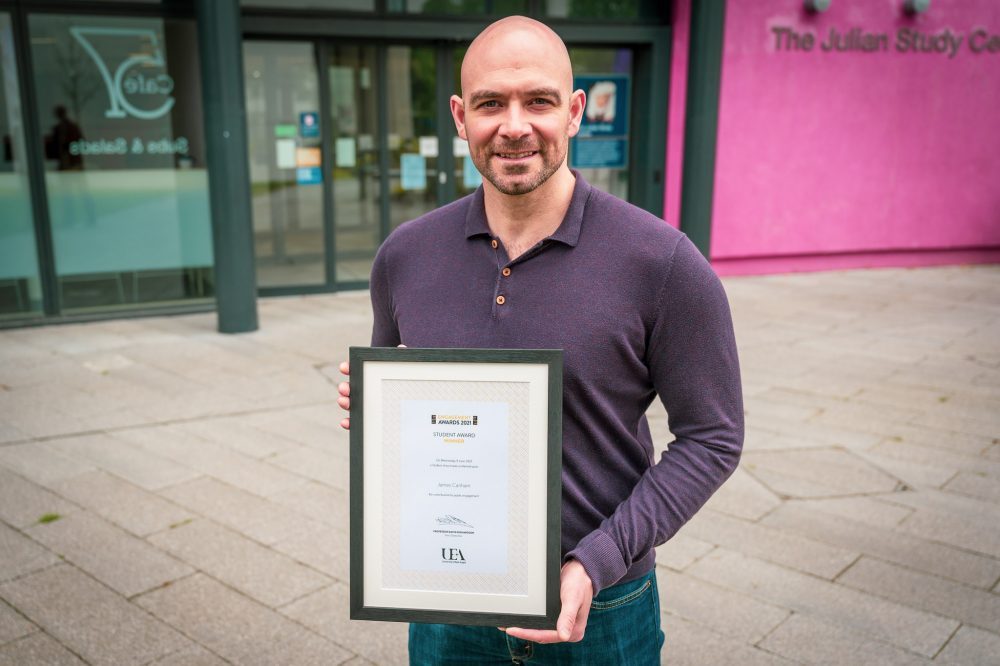United Kingdom
June 16, 2021
 James Canham with his UEA Public Engagement Award
James Canham with his UEA Public Engagement Award
James Canham is a PhD student in the Professor Saskia Hogenhout lab.
His research is concerned with the interaction between herbivorous insects and plants and focuses on the molecular exchange that allows a plant to perceive the insect and mediate a successful defence response.
By understanding these elaborate plant defence strategies to insects, he hopes to identify genetic resistance in crops.
As part of his research James used his PIPs placement at Pwani University in Kenya to establish a new research consortium, involving over one dozen scientists across five institutes, the success of which has helped earn him a UEA Engagement Award.
We caught up with James to find out more.
“During my PIPS placement in Kenya, I established the consortium to facilitate rapid intervention and mitigate the risks posed by (re-)emerging insect-associated crop diseases in East Africa.
I felt such a consortium would be vital because there is a lack of capacity locally to study the causal agents of disease. A greater understanding would enable stakeholders to rapidly respond to emerging threats in a targeted and efficacious manner.
There was an opportunity to establish a partnership of researchers, stakeholders and policy makers based at Pwani University, Kenya, the Kenya Plant Health Inspectorate Service (KEPHIS) and the John Innes Centre, resulting in the ‘UK-Kenya Insect-Vector-Borne Plant Disease Consortium’.
The consortium was established in three developmental stages.
- Identify the key partners and collaborators by highlighting how outcomes would benefit them directly
- Study lethal yellowing disease of coconuts as a test case to generate and assess workflows and physical links between partners
- Finally, we are commencing an expansion to study other pathosystems
We have managed to gain around £9,000 in funding from the Biomaker-OpenPlant fund and Plant Health ISP funding. These funds have been crucial in supplying materials for undergraduate and postgraduate students based at Pwani University as well as support our work here at the John Innes Centre.
A key partner in the consortium is the Kenya Plant Health Inspectorate Service (KEPHIS) whose responsibility is to assure the quality of agricultural inputs and produce to prevent adverse impacts on the economy, the environment and human health.
Dr Isaac Macharia, the GM of KEPHIS, immediately saw the benefits of our partnership and is heading a team to support our work in Kenya.
We have already established working pipelines to rapidly identify causal pathogens as they emerge. Recently, we formally identified the causal agent of lethal yellowing of coconut palms – a phytoplasma-associated disease of coconut and oil palms that threatens the entire industry.
We are now in the process of using whole-genome sequencing to aid our understanding of the phytoplasma-coconut interaction and specifically the role of phytoplasma virulence factors and how they perturb their plant targets. I hope that once we’ve uncovered more information, we may identify novel mechanisms of resistance to the phytoplasma.
Another emerging insect-vector-borne disease in the region is Liberibacter-associated citrus greening. Given the drive and reach of the partnership, I think we are in an excellent position to begin to investigate this, as well as other pathosystems.
The partnership will greatly benefit from further input. If you have any comments or would like to know more about how you can contribute, don’t hesitate to get in touch.
In terms of my own career, I took an unusual route to becoming a PhD student. I worked in sports turf management for 10 years after my GCSEs.
I was always grasping for more information as to why the plants I cared for responded to the environment in certain ways. This led me back to full-time education where I have gained a much deeper understanding of precisely why and how plant respond to external stimuli.
If the opportunity arises, I would love to continue plant science research. My experiences as a postgraduate student at the John Innes Centre has only amplified my desire to understand more about the natural world.
I would like to sincerely thank the consortium partners Professor Santie De Villiers, Dr Rose Kigathi, Dr Naiya Mohamed, Simon Muti and Alphaxand Kaimba of Pwani University as well as KEPHIS partners Florence Munguti, Dr Isaac Macharia, John Muli, Thomas Kosiom and Ivan Obare.
The project would not be possible without staff and scientists here at the John Innes Centre, Professor Saskia Hogenhout, Roland Wouters, Sylvain Capdevielle, Dr Weijie Huang, Matt Heaton, Chris Darby and Angela Payne.”